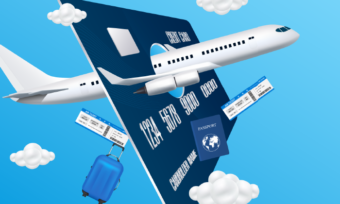To make your dollars go further overseas, here are some travel money options you should consider packing:
Travel debit cards
Using your usual debit card to make purchases or withdraw money overseas could chew through your holiday dollars faster than necessary. Using a debit card to withdraw money from an overseas ATM typically comes with a 2-3% service fee from your bank. And this is before any other fees are added, which can include:
- International bank ATM fees
- Currency conversion fees
However, some travel debit cards have no currency conversion fees or overseas ATM fees. In fact, some travel debit cards offer cashback rewards or relatively high interest, earning you money.
Travel money cards
If you’re super-conscious of sticking to a budget, loading cash onto a travel money card may be your go-to. These cards are widely accepted, you can lock in an exchange rate before you go, and if they are lost or stolen they can be replaced easily.
The best travel money cards have low transaction fees and offer currency exchanges at the interbank rate. That’s the rate that banks use when trading foreign currency, with a mid-point used between the buy and sell rates across two currencies.
Most providers offer a range of currencies, which is handy if you’re planning to skip around the globe, stopping at a bunch of destinations. However, if you’re considering getting a travel money card, bear in mind:
- Overseas ATMs and merchants may charge transaction fees
- Potential cross-currency fees if you convert money to another currency
- Any inactivity fees
- If there are any fees involved with recovering any unused currency on the card
Compare Travel Money Cards with Canstar
Credit cards
Planning on flexing the plastic overseas? Credit cards can be an easy option for purchases, but avoid using them to withdraw cash. Interest rates/fees for cash advances are high, and adding in international bank ATM fees and currency conversion fees can increase the cost significantly.
Some credit cards offer rewards points and, for regular travellers, these may help offset some of the costs associated with using the card.
Compare credit cards with Canstar!
Travel money tips
- Look for a travel debit card that has no account-keeping fees, currency conversion fees, or overseas ATM fees and offers cashback or high interest rates
- If you want to withdraw cash, use a fee-free debit card or a travel money card rather than your credit card
- Check that your travel money card uses the interbank exchange rate, covers the currencies you need and has low transaction fees Additionally, cancel it when you’re back on home ground if you’re liable to be hit with inactivity fees
- Make sure you know how to reload your travel money card. If a shopping spree or unexpected expenses cause your funds to run low before you’re homeward bound, its often easy to reload online
Travel insurance
While overseas trips can be full of surprises, it can hurt your hip pocket if they’re of the nasty kind. That’s why travel insurance is important.
The New Zealand government website SafeTravel recommends travel insurance for anyone taking a trip overseas. If you don’t have travel insurance and you lose your luggage, have an accident, medical emergency, or legal incident, you could face huge bills.
Cancelled flights and hotel accommodation can leave you out of pocket by thousands of dollars, but medical expenses can be even worse. A health emergency overseas can end up costing hundreds of thousands of dollars.
However, if you have travel insurance, you can travel confidently knowing you can get financial help in an emergency.
Travel insurance tips
- Tempted to go with the free travel insurance offered by your credit card provider? Read the fine print. Often it’s basic cover that will protect you for fewer situations and has lower limits. Plus, you may have to activate it in some way
- Planning to let your adventurous side go wild overseas? Check what activities are covered before letting loose on the ski fields or abseiling over a cliff. Even golf may not be covered by a basic policy
- Comprehensive policies cover more situations including possibly a rental car excess, cancellation costs, and trip delays but it’s still important to check limits and exclusions in the fine print
Compare travel insurance with Canstar
About the reviewer of this page
This report was reviewed by Canstar Content Producer, Caitlin Bingham. Caitlin is an experienced writer whose passion for creativity led her to study communication and journalism. She began her career freelancing as a content writer, before joining the Canstar team.
Enjoy reading this article?
You can like us on Facebook and get social, or sign up to receive more news like this straight to your inbox.
By subscribing you agree to the Canstar Privacy Policy





Share this article